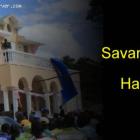Video of Delimart Plaza being looted by demonstrators in Port-au-Prince
ADVERTISEMENT
Recently on July 6, 2018, when everybody was enjoying the world cup football quarterfinal matches, the Haitian Commerce and Economic Ministry issued a joint statement announcing an increase of 38%, 47% and 51% price for gasoline, diesel, and kerosene respectively. Major protests erupted on Friday in the country with demonstrators using burning tires and barricades to block major streets across the capital and in the northern city of Cap-Haitien. Dozens of shops were looted and burned. Cars were set ablaze. At least four people were killed.
Two protesters were seen to be fatally shot in the Delmas area of the capital as demonstrators clashed with police. It was unclear who shot the men. The third death was a security guard of a former political candidate who was stopped at a barricade. An Associated Press journalist saw the security guard got out of his vehicle and fired a gun in the air to disperse protesters, however, the crowd seized the man when he ran out of bullets, beat him to death and set his body aflame as the vehicle sped off.
A liter of diesel will cost about $4 and a liter of regular gas will cost nearly $5 under the new prices. It was a big blow to the common man of a country where about 80% of the people earn less than $2 a day.
As per last news, the Haitian government bowed to pressure and suspended the fuel price hike on Saturday after widespread violence.
One question remains unanswered: Were all the persons present in the crowds were looters or criminals?
Maybe most of them were out with an intention to protest not to loot or burn. It usually takes an incident or a simple spark to get a riot started. If people get agitated about some injustice, even a peaceful person who is present in the crowd could be easily swept by the crowd's contagious feeling and do things that would be very unlikely under every other circumstance: shouting, shoving, throwing rocks, smashing windows, and, yes, even looting. Such "mass psychology" offers a kind of intense belonging, not dissimilar to what others feel. This is how an act of looting or arson gains its momentum. Haiti is desperately poor: around 60% of its people live on less than two dollars a day. Haiti has had slavery, revolution, debt, deforestation, corruption, exploitation and violence. They have enough reasons to become extremely sensitive to even minor increases in prices of just about anything.
Read more: Manifestation, protest, food, fuel prices, Fuel, Gas, Reginald Boulos, Looting, Delimart, Newsletter Articles, Agriculture and Food
« Video of Hotel Royal Oasis in the middle of raging fire | Main | Over a dozen US Marines on the way to Haiti for reinforcement »
Leave a Reply
Name (required) E-mail (required, will not be published)
» »
Our objective is to share with you news and information about Haiti and the people of Haiti. Traditions, habits and the way we were or grew are alive in this site. We highly recommend that you Subscribe to our Newsletter and also share with us some of the things that are memorable and made us unique people.


 Haiti tech Summit
Haiti tech Summit  Newsletter
Newsletter  The Town of Savanette, Haiti
The Town of Savanette, Haiti  Black Friday Shopping Season
Black Friday Shopping Season  Something to think about
Something to think about